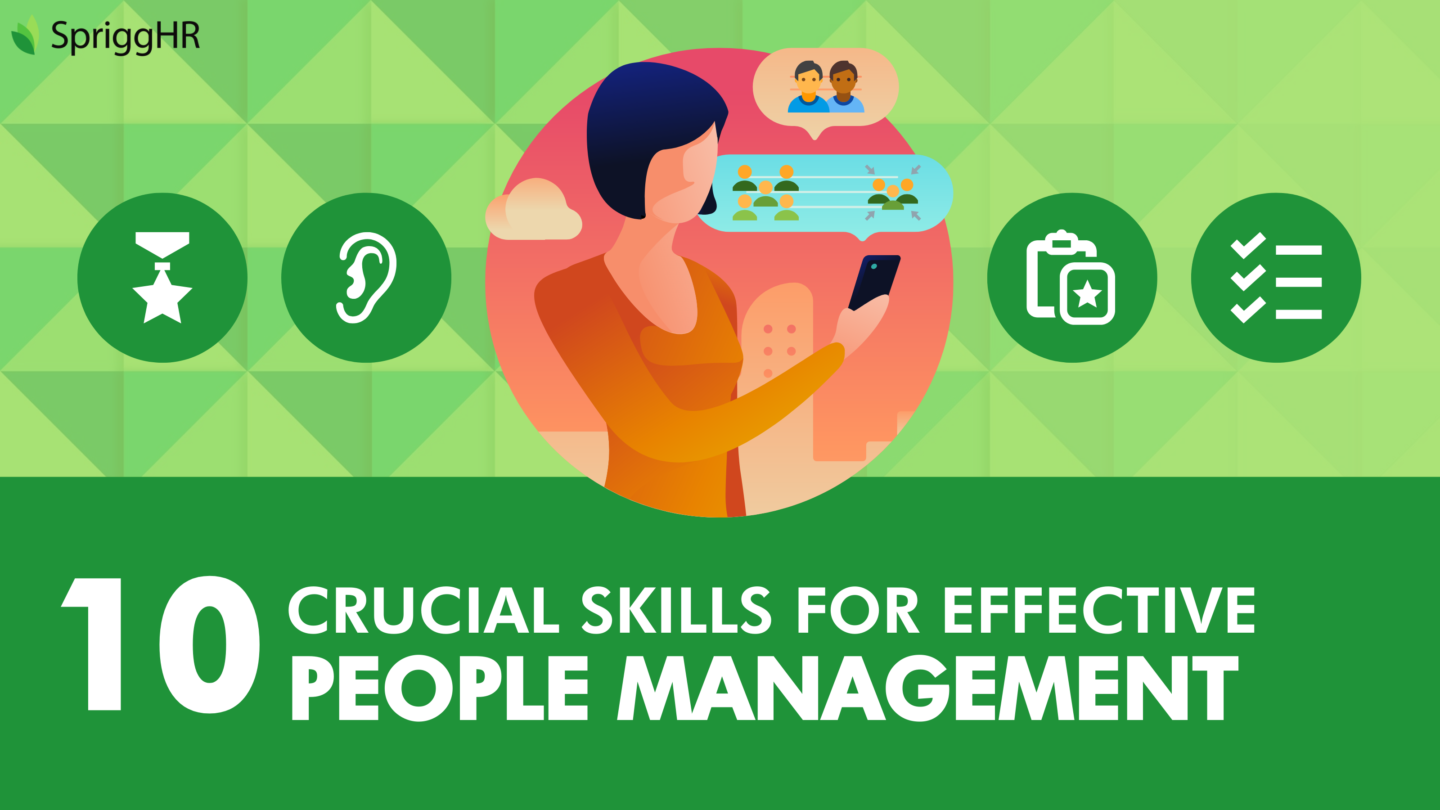
10 Crucial People Management Skills
Effective people management is a necessary skillset for current and aspiring leaders who hope to achieve a workplace built on strong communication and clear pathways to employee success. People management skills can make all the difference between negative, mediocre, positive, and great employee experiences and therefore, engagement.
Though work environments are constantly changing as new upgrades and developments are made in the industry, a pivotal aim for your business should always be to manage people in a way that creates a motivated team as high performing and engaged, as you are. After all, speed of the leader equals speed of the pack.
All too often leaders are placed in a position to manage a team of people because they are subject matter experts of a given skill or knowledge base. Leading people is very different than leading a process.
What is People Management?
People management refers to the set of practices that encompasses the training, motivating, and directing of employees in order to optimize workplace productivity and promote professional growth. It outlines the end-to-end processes of talent acquisition, talent optimization, and talent retention, while also providing continued support for the organization and guidance for its employees.
People management is a key sub-set of any human resources department. It deals with every aspect of how employees work, behave, contribute, and grow at work. The strategies employed by an organization to manage its people affects the overall workings of the organization itself, and thus need to be clearly outlined in individual pieces while also working cohesively towards the bigger picture.
When are People Management Skills Important?
Leaders in the workplace use people management skills to oversee employee workflow and boost performance on a regular basis. However, strong people management skills can be useful in all kinds of workplace situations, including:
- Handling Interpersonal Conflicts. Leaders play an important role when it comes to resolving conflicts in the workplace. Effective people management can help to mediate conflicts in a way that encourages collaboration and mutual respect.
- Leading Employee Training. As a leader, you are likely to be responsible for the onboarding processes for new employees, and the coaching of current employees on updated processes. Providing constructive and useful feedback, and mentoring employees in such a way that enables them to succeed in their positions is a critical skillset to ensure a proper transition for the new employee but also for long-term retention.
- Managing Deadlines. Overseeing employee duties includes the delegation of tasks and the establishment of achievable goals. A solid understanding of managing people is the baseline when evaluating your organization’s resources and when setting deadlines that encourage progress and motivation within the team.
- Building Company Culture. Any good leader knows how to positively influence their work environment, and people management skills are an integral element to this. By drawing on your people management responsibilities, you can build a healthy rapport with employees, ask your team for constructive feedback, and then use that feedback to make actionable changes in your company culture that promotes employee growth and success.

Crucial People Management Skills
People management requires a core set of skills that can adapt to the demands and needs of both your employees and your organizational goals. By implementing these skills into your strategy, you open the door to honest and transparent communication, improved employee experience and performance, and a healthier rapport between you and your employees.
Here are 10 essential people management skills to incorporate into your workplace:
- Empowerment of Employees
- Active Listening
- Conflict-Resolution
- Flexibility
- Patience
- Clear Communication
- Trust-Building
- Organization
- Appreciation
- Knowledge-Seeking
Let’s take a closer look at each of these people management skills.
1. Empowerment of Employees
Making efforts to empower your employees enables them to develop new skills and be more productive in the long-run. This involves training new employees well, giving them the knowledge and resources required to perform their assigned tasks successfully, and being a consistent resource for support in their continuous learning process.
The aspects involved in empowering employees include:
- Being available for questions and additional training when needed.
- Encouraging employees to take on additional skill-building courses or learning opportunities.
- Allowing employees to adjust their workflow processes if it improves their productivity and success.
- Offering real-time, constructive feedback to encourage skill-building.
- Supporting employees during challenging projects.
2. Active Listening
This refers to the practice of listening to the speaker in order to fully understand their perspective, question, or concern before choosing the right way to respond. Active listening involves removing potential distractions, maintaining eye contact with the speaker, and offering verbal or non-verbal cues that indicate your engagement with the conversation.
If an employee comes to you with a question or concern, they want to have addressed, be sure to use nonverbal cues such as nodding to demonstrate your engagement and understanding while they’re speaking. Be sure to respond thoughtfully, repeating a brief summary of their message to show you were engaged. If your understanding of their concern is correct, ask follow-up questions to get a better sense of what they need. You can also express your empathy with their experience, which will assure them that you understand and respect them.
3. Conflict-Resolution
Addressing interpersonal challenges is an integral part of people management. Solid conflict/dispute-resolution skills are essential to leading people and can circumvent the possibility for employees to feel their concerns haven’t been understood.
In conflict-resolution cases, you can start by analyzing the situation and then identify what the possible causes of the conflict might be. If the situation involves a miscommunication or opposing opinions, try mediating between the differing parties and guiding them towards a compromise or a collective understanding. After mediation, be sure to regularly monitor the situation to make sure the conflict remains fully resolved, and to prevent it from occurring again. Keep in mind that each party has a responsibility to own and manage their part of the resolution process.

4. Flexibility
Effective people management involves knowing when to be flexible and when to be firm in your direction of employees. Demonstrating flexibility in your people management style could involve the accommodation of individual employee needs. For example, adjustable schedules, remote work options, and allowing employees the autonomy to adjust their individual workflow to maximize their productivity. Be sure to assess the results of their processes to ensure its efficiency and be ready to help them revise the process if it can be optimized.
5. Patience
As a people management skill, patience encompasses the use of kindness, respect, and empathy while helping others overcome obstacles. Patience is valuable when training new employees, teaching new processes, handling conflicts, or solving interpersonal problems. Employees who trust that their managers are patient are much more likely to ask for clarification, ensuring they understand your directions and resultingly increasing their quality of work.
6. Clear Communication
Communication is an essential people management skill that allows team members to collaborate in solving problems, brainstorming new ideas, and adapting to changes. Your value as a team member and as an effective leader hinges upon your ability to clearly communicate with your coworkers.
Practicing effective communication can be as easy as using clear and simple language, ensuring every recipient understands your message. It can also involve a revision of the way you communicate that avoids barriers, such as information overload or inaccessible terms and diction. Allow your employees the opportunity to ask clarifying questions and be sure to directly confirm that each employee understands the information to prevent miscommunication.
7. Trust-Building
Trust in the workplace means believing you can rely on a coworkers’ abilities, assistance, or advice when you need it most. Employing trust-building as one of your people management skills helps your team to work together more efficiently and productively. Team members should all be able to trust that their leader supports them and believes in their efforts, and in turn, leaders should be able to trust that their team can complete their tasks correctly and efficiently.
To build trust in your team, you should consistently perform your tasks and demonstrate technical skills when employees come to you for help. You can also encourage trust during constructive feedback sessions, helping team members improve their skills and quality of work.

8. Organization
As a leader, part of your duties will always involve managing several different ongoing tasks simultaneously. Organization is a crucial skill to develop in order to stay on top of each moving piece in your team, tracking and maintaining their productivity. Components of effective organization include:
- Properly assigning tasks to team members.
- Conducting meetings that discuss information in a productive and efficient manner.
- Being prompt in your response time to emails, approval requests, and questions.
- Keeping a calendar to actively track deadlines and progress.
9. Appreciation
Being able to appreciate your employees and their efforts is a people management skill that should be mastered if you are to be an effective leader. An important aspect of guiding a team is praising and rewarding them for a job well done. This impacts how every individual perceives their work and the value of their efforts, and positively influences how the organization measures and reacts to individual successes. Including a process of appreciation that goes beyond monetary bonuses helps to create a culture of gratitude in the workplace, one that will evidently improve employee experience and satisfaction.
10. Knowledge-Seeking
As a people manager, having access to the right data and information is as crucial as what you choose to do with it. Your effectiveness as a leader depends largely on the way you choose to apply the data you have access to, building a knowledge and information base that aids company decisions, provides insights into company proceedings and goals, and enables a deeper understanding of people and processes.
Become the Leader Your Team Deserves
The responsibility of managing a team does not come with a handbook, which is why many leaders spend a significant amount of time investing in the development of skills that can adapt to the needs of their company. Remember: leading people is very different than leading a process and just because you’re a subject matter expert in one field, does not equate to instantly being able to lead and manage people effectively.
By incorporating the above-mentioned skills into your people management strategy, you can strengthen your current performance and become a stronger candidate for future leadership roles. The application of these skills not only benefits you but will inevitably encourage a company culture that promotes employee engagement, success, and satisfaction.




